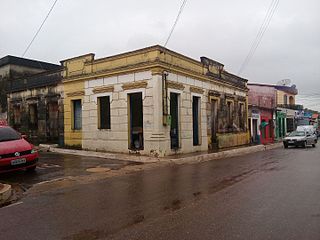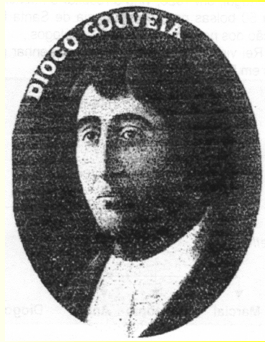Related Research Articles
Nuno Tristão was a 15th-century Portuguese explorer and slave trader, active in the early 1440s, traditionally thought to be the first European to reach the region of Guinea. Legend has it that he sailed as far as Guinea-Bissau, however, more recent historians believe he did not go beyond the Gambia River.
Captain Baltasar Fernandes was a Portuguese colonist of Brazil who led the expeditions called Bandeirantes into the interior seeking gold, silver, and iron. He was the founder and one of the first settlers of Sorocaba in 1654.
Alvim may refer to:
Diogo António José Leite Pereira de Melo e Alvim was a former Portuguese colonial Governor of Portuguese Guinea from 1954 to 1956.

Viseu is a Brazilian municipality in the state of Pará. It is located at an altitude of 15 meters. Its estimated population in 2021 was 62,093 inhabitants according to IBGE. It has an area of 4,972.897 km2 and, thus, the population density of 12.57 inhabitants/km2. Most people are Catholic, according to the Brazilian Institute of Geography and Statistics (IBGE). The municipal HDI is 0.515. The lands visuenses were discovered around June 24, 1531 by the navigator Diogo Leite.
Diogo José Rosário Gomes Figueiras is a Portuguese professional footballer who plays as a right-back for Spanish club Inter Sevilla.
Fermentelos is a civil parish in the municipality of Águeda in the district of Aveiro, Portugal. The population in 2011 was 3,258, in an area of 8.58 km2. A minor village within an independent parish, the area was elevated to the status of vila on 5 May 1928.

Diogo de Gouveia, known as Diogo de Gouveia, the Elder to distinguish him from contemporary homonyms such as his nephew, was a leading Portuguese teacher, theologian, diplomat and humanist during the Renaissance. With an extensive academic curriculum as rector at the University of Paris, he served King Manuel I and king John III of Portugal, whom he advised on the creation of captaincies in Brazil and the coming of the first Jesuit missionaries and notably Francis Xavier. First of a lineage of distinguished humanists and educators, he was the uncle of André de Gouveia, António de Gouveia, Diogo de Gouveia "the younger", and Marcial de Gouveia. During the Counter-Reformation he was a strong supporter of scholastic and Catholic orthodoxy, clashing with the liberal views of his nephew André de Gouveia.

The Roman ruins of Ammaia are located in Portugal within the Nature Park of the Serra de São Mamede, a mountainous expanse of forest in the civil parish of São Salvador da Aramenha, municipality of Marvão, along the border with Spain.

The Portuguese Renaissance refers to the cultural and artistic movement in Portugal during the 15th and 16th centuries. Though the movement coincided with the Spanish and Italian Renaissances, the Portuguese Renaissance was largely separate from other European Renaissances and instead was extremely important in opening Europe to the unknown and bringing a more worldly view to those European Renaissances, as at the time the Portuguese Empire spanned the globe.
Tentação is a 1997 Portuguese drama film directed by Joaquim Leitão. It was released on 26 December 1997.

Diogo José Teixeira da Silva, known as Diogo Jota, is a Portuguese professional footballer who plays as a forward or left winger for Premier League club Liverpool and the Portugal national team. Jota is known for his clinical finishing, explosive pace, and dribbling ability.
Diogo is a Portuguese masculine given name and surname.
Portugal was represented at the Eurovision Song Contest 1968 with the song "Verão", composed by Pedro Vaz Osório, with lyrics by José Alberto Diogo, and performed by Carlos Mendes. The Portuguese participating broadcaster, Radiotelevisão Portuguesa (RTP), selected its entry at the Grande Prémio TV da Canção Portuguesa 1968.

Diogo Meireles da Costa is a Portuguese professional footballer who plays as a goalkeeper for Primeira Liga club Porto, which he captains, and the Portugal national team.

Diogo Filipe Monteiro Pinto Leite is a Portuguese professional footballer who plays as a centre-back for Bundesliga club Union Berlin.
Diogo Leite de Sousa is a Portuguese footballer who plays for Valadares Gaia FC as a right back.
Diogo Leite may refer to:
João Mário Neto Lopes, known as João Mário, is a Portuguese professional footballer who plays as a right-back or winger for Primeira Liga club Porto and the Portugal national team.
The 2021–22 season was the 128th season in the existence of FC Porto and the club's 88th consecutive season in the top flight of Portuguese football. In addition to the domestic league, Porto participated in this season's editions of the Taça de Portugal, the Taça da Liga, the UEFA Champions League and the UEFA Europa League.
References
- ↑ Peres, Alberto (16 May 2008). "Futebol: Boavista – Crise provoca "apreensão" e "expectativa" nos escalões de formação" (in Portuguese). LUSA. Archived from the original on 25 July 2011. Retrieved 12 January 2010.